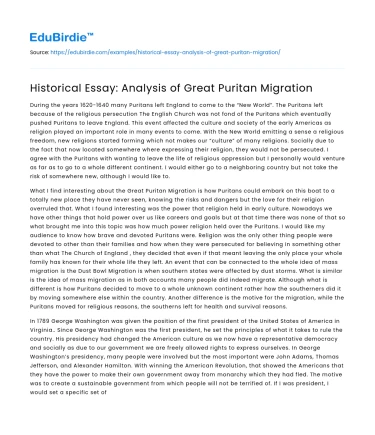Introduction
The Great Puritan Migration, spanning from 1620 to 1640, represents a pivotal epoch in early American history, characterized by the mass exodus of English Puritans to New England. Motivated by a quest for religious freedom, this migration was not merely a movement of people but a transplanting of an entire cultural and ideological system. As the Puritans sought to escape the perceived corruption of the Church of England, their journey laid the foundations for a society deeply rooted in religious doctrine and communal governance. This essay seeks to explore the historical significance of this migration, examining its causes, impacts, and the eventual integration into the broader American narrative. By understanding the Great Puritan Migration, we gain insights into the socio-religious dynamics that shaped early colonial life and continue to influence the cultural and political landscape of the United States today.
Causes of the Great Puritan Migration
The Great Puritan Migration was primarily spurred by religious and political turmoil in England. The Puritans, a faction within the Protestant Church, were staunch advocates for the purification of the Church of England from what they saw as lingering Catholic practices. Their calls for reform, however, were met with resistance and persecution under the reign of King Charles I. As historian Perry Miller notes, "The Puritans faced a climate of hostility and intolerance, prompting them to seek a new haven for their religious practices" (Miller, 1956). The political unrest of the English Civil War further exacerbated these tensions, underscoring the need for a refuge where they could freely exercise their beliefs.
Save your time!
We can take care of your essay
- Proper editing and formatting
- Free revision, title page, and bibliography
- Flexible prices and money-back guarantee
In addition to religious and political factors, economic motivations also played a crucial role. England in the early 17th century was grappling with economic instability, characterized by population growth, inflation, and unemployment. For many Puritans, the New World offered not only religious sanctuary but also the promise of land and economic opportunity. The Massachusetts Bay Company, chartered in 1629, provided a structured means for migration, attracting those seeking a new beginning. According to David Hackett Fischer, "The Puritan migration was as much a quest for economic stability as it was for religious autonomy" (Fischer, 1989). This dual motivation of spiritual and material aspirations set the stage for their journey across the Atlantic.
Impact on New England Society
The arrival of the Puritans in New England had a profound impact on the social and political structures of the region. Their settlement patterns were distinct, often centered around tightly-knit communities governed by a theocratic legal system. The Puritan emphasis on education and literacy, driven by the need to read the Bible, led to the establishment of schools and colleges, most notably Harvard College in 1636. As noted by Edmund S. Morgan, "The Puritans' commitment to education laid the groundwork for a society that valued knowledge and civic responsibility" (Morgan, 1967).
Moreover, the Puritans brought with them a strong work ethic and communal ethos, which became hallmarks of New England culture. Their governance model, which combined religious and civil authority, was both a source of social cohesion and contention. While it fostered a sense of community, it also led to conflicts with Native American populations and dissenters within their own ranks. The infamous Salem Witch Trials of 1692, for example, can be traced back to the rigid social structure and religious zeal that characterized Puritan society. However, despite these challenges, the Puritans' influence was enduring, shaping the moral and ethical compass of the region for generations.
Legacy and Counter-Arguments
The legacy of the Great Puritan Migration is evident in the enduring cultural and religious values of New England. The Puritans' emphasis on community, work ethic, and education continued to influence American society long after their initial settlement. Yet, this legacy is not without its controversies. Critics argue that the Puritanical approach fostered an environment of intolerance and exclusion, particularly towards those who did not conform to their rigid beliefs. As Karen Ordahl Kupperman observes, "The Puritan ideal of a 'city upon a hill' often meant marginalizing those who did not fit their narrow vision of a godly community" (Kupperman, 1993).
Furthermore, the Puritans' interactions with Native Americans were marked by conflict and displacement, contributing to the broader narrative of colonial expansion and its consequences. While the Puritans sought to create a utopian society, their actions often belied their ideals. However, it is essential to recognize that the Puritans were products of their time, navigating the complex realities of colonization and survival. The dual nature of their legacy—both as pioneers of religious freedom and as agents of exclusion—continues to spark debate among historians and scholars.
Conclusion
The Great Puritan Migration remains a defining moment in early American history, encapsulating the complexities of migration, religious freedom, and cultural transformation. While driven by a desire for religious autonomy, the Puritans' journey was equally influenced by economic and political factors, leading to the establishment of a society that deeply impacted the development of New England. Their legacy, characterized by both admirable contributions and contentious practices, offers a nuanced perspective on the challenges of creating a new world. By examining the Great Puritan Migration, we not only gain a deeper understanding of the past but also reflect on the enduring influence of these early settlers on the American ethos.






 Stuck on your essay?
Stuck on your essay?

